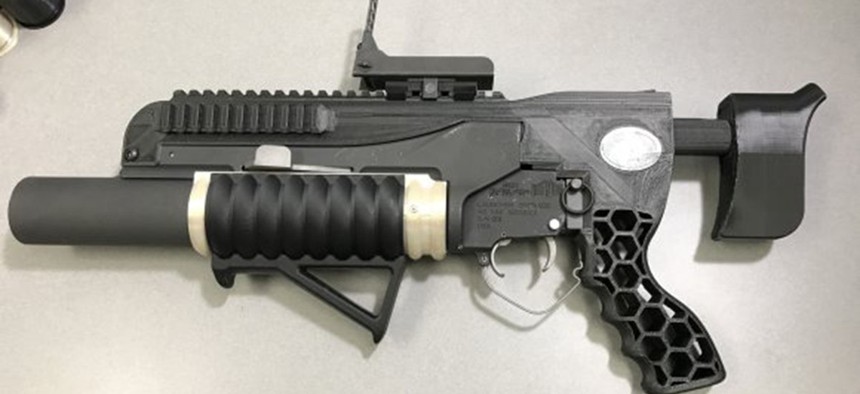3D-Printed Gun Designs Are Selling for $12 on the Dark Web

The additive-manufactured RAMBO system includes an NSRDEC-designed standalone kit with printed adjustable buttstock, mounts, grips and other modifications—modifications made possible by the quick turnaround time afforded by 3D printing. US Army
A new report shows just how easy it is becoming to download designs for difficult-to-trace arms.
In the darker corners of the Internet where search engines cannot go, black markets offer pistols, machine guns, even explosives — and most worrisome to security researchers, computer aided design, or CAD, files for 3D-printed guns.
A new report from RAND looked at 811 weapons listings on a dozen dark-web markets, which continue to thrive despite the shuttering of sites like the Silk Road and, just this month, AlphaBay. Firearms were the top-selling category, with was 339 active listings, roughly 42 percent of the market. But the next-largest share, with 222 listings, was a variety of digital products, from build-it-yourself explosives manuals to CAD files.
The researchers note such digital products pose “additional challenges,” to law enforcement.
“While guides and manuals on how to make bombs at home were illegally circulating on the web well before the establishment of cryptomarkets, the level of accessibility provided by these platforms represents reason for high concern among policy makers and practitioners,” they write.
Arms watchers have been fretting about 3D-printed guns for years. In 2014, European researchers with the Small Arms Survey presented a working paper to the United Nations that featured an entire chapter on the 3D-printed future.
To be sure, 3D-printing files aren’t a huge share of the dark-web market yet; they accounted for just 11 of the hundreds of for-sale items catalogued by the RAND researchers. And because the RAND study is the first of its kind to attempt to measure this market, there is no trend line to attach that figure to.
Still, the report illuminated some important and frightening details about the future of the market. The average gun on the dark web was going for a bit under $1,200. (Replicas of popular brands can actually be a bit more costly because they’re tougher to trace.) But the price tag for CAD designs to print a gun averaged just $12. And some of those sale items included files to print multiple types.
What that suggests is that the black market for 3D-printed gun designs will be much larger than today’s online market for regular firearms. The products are safer to transmit (since the seller need not use the Postal Service) and the inventory is limitless.
Of course, not every would-be terrorist or criminal will become an overnight master of additive manufacturing. And the technology is still very young and relatively unproven. “The margins for technical or human errors remain significant even with the improvements in the available technology,” the authors note. “Nevertheless, the implications deriving from the easy availability of these files should not be underestimated.”






